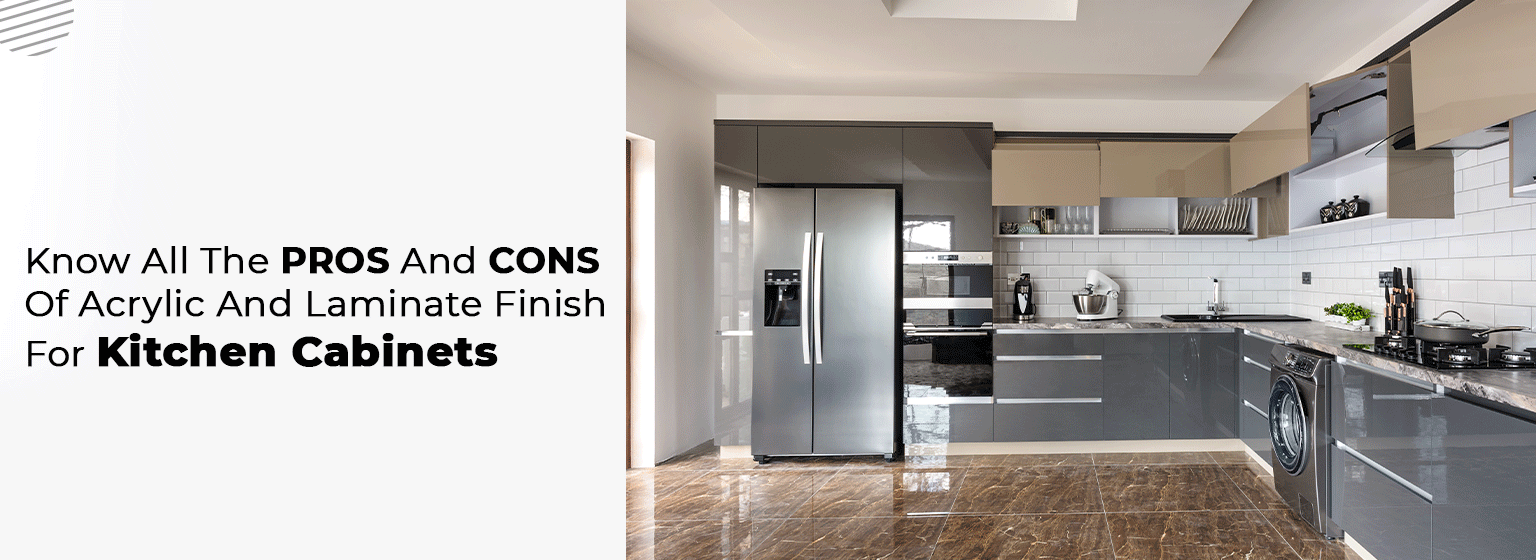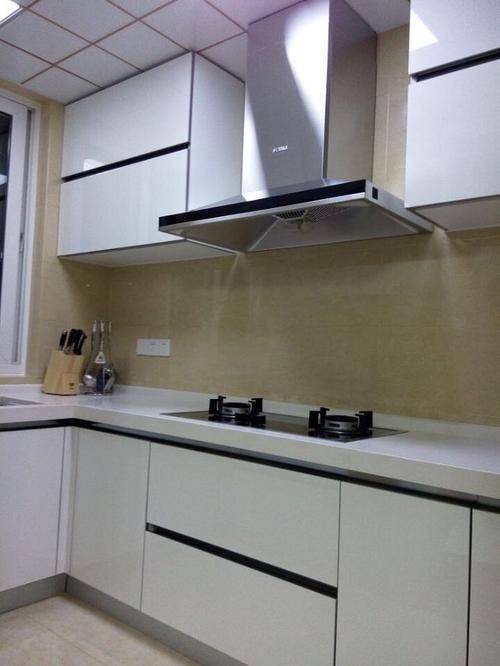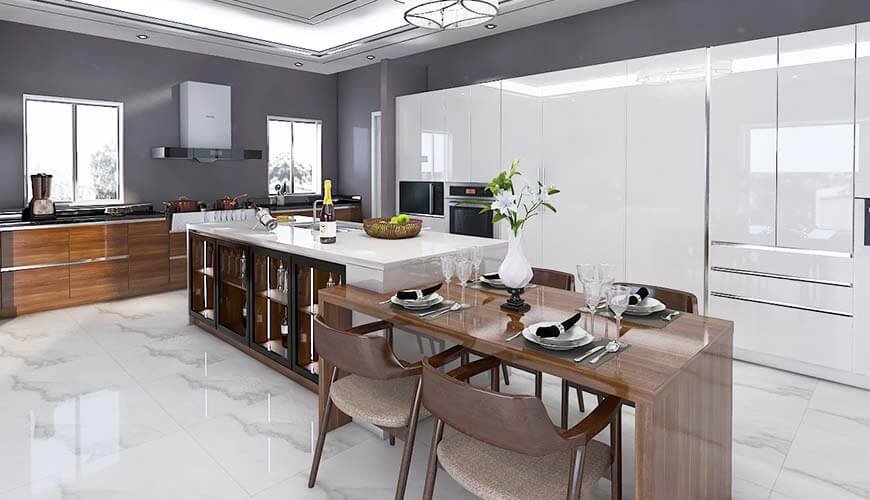**Pros and Cons of Acrylic Kitchen Cabinets:** Acrylic cabinets are durable, glossy, and easy to clean. They can be expensive and scratch-prone.
Acrylic kitchen cabinets have become popular due to their sleek, modern appearance. Their high-gloss finish reflects light, making kitchens look spacious and bright. These cabinets are highly durable and resistant to moisture and UV light, ensuring long-lasting beauty. Cleaning is a breeze, as they resist stains and fingerprints.
Despite these advantages, acrylic cabinets can be pricey, potentially straining budgets. Scratches can also be an issue, requiring careful handling to maintain their pristine look. Considering these factors helps homeowners make informed decisions on whether acrylic kitchen cabinets are right for their needs.

Credit: radheshyamlaminates.com
Table of Contents
ToggleAesthetic Appeal
Acrylic kitchen cabinets have gained popularity for their stunning visual appeal. They offer a sleek, modern look that can transform any kitchen. Let’s explore their aesthetic benefits.
High Gloss Finish
Acrylic cabinets are known for their high gloss finish. This finish creates a smooth and shiny surface that reflects light beautifully. The glossiness adds a touch of luxury and makes the kitchen look larger.
The reflective surface is easy to clean. It resists scratches and stains, maintaining its shine over time. This makes acrylic cabinets a practical choice for busy kitchens.
Color Variety
Acrylic cabinets are available in a wide range of colors. Whether you prefer bold, vibrant hues or subtle, muted tones, you’ll find an option that suits your taste.
This color variety allows you to customize your kitchen to match your personal style. You can even mix and match colors for a unique, personalized look.
The colors remain vivid and do not fade, ensuring your kitchen stays beautiful for years.
| Pros | Cons |
|---|---|
| High gloss finish | Can show fingerprints |
| Wide color variety | More expensive than other materials |
| Easy to clean | Prone to scratches |
Durability
Durability is a key factor when choosing kitchen cabinets. Acrylic kitchen cabinets offer impressive durability compared to other materials. Let’s explore their durability in terms of scratch resistance and moisture resistance.
Scratch Resistance
Acrylic kitchen cabinets are highly resistant to scratches. This is due to the hard acrylic coating on the surface. It protects the cabinets from daily wear and tear. Kids and pets won’t easily damage these cabinets.
Acrylic surfaces maintain their shine and smoothness for years. This makes them a great choice for busy kitchens. You won’t need to worry about frequent repairs or replacements.
Moisture Resistance
Acrylic cabinets are highly resistant to moisture. This is especially important in kitchens. The acrylic coating prevents water from seeping into the material. This keeps the cabinets from warping or swelling.
Moisture resistance ensures the cabinets last longer. You won’t face issues like mold or mildew. This makes acrylic cabinets a hygienic option for your kitchen.
Maintenance
Maintaining your kitchen cabinets is essential for their longevity and appearance. Acrylic kitchen cabinets offer a blend of style and practicality. But how easy are they to maintain? Let’s dive into the details.
Cleaning Ease
Acrylic kitchen cabinets are easy to clean. Their smooth surface repels dust and grime. You only need a soft cloth and mild detergent. Wipe the surface gently. Avoid abrasive materials. They can scratch the acrylic.
Stain Resistance
One of the biggest advantages is their stain resistance. Acrylic finishes resist stains from common kitchen spills. Spills like sauces and oils can be wiped away easily. This property makes them ideal for busy kitchens. The non-porous surface does not absorb liquids.

Credit: pakitchencabinets.com
Cost Factor
The cost of acrylic kitchen cabinets is a significant consideration. Understanding the price factors helps in making an informed decision. Let’s delve into the initial investment and long-term value of these cabinets.
Initial Investment
Acrylic kitchen cabinets often come with a higher upfront cost. The glossy finish and modern look contribute to the price. Here are some key points to consider:
- Material Quality: High-quality acrylic materials can be expensive.
- Manufacturing Process: The production process is intricate and adds to the cost.
- Customization: Custom designs and colors can increase initial expenses.
Despite the higher cost, many homeowners find the visual appeal worth the investment. The sleek, glossy finish of acrylic cabinets adds a touch of luxury to any kitchen.
Long-term Value
Acrylic cabinets offer excellent long-term value due to their durability. They resist moisture, UV light, and scratches better than many other materials.
| Pros | Cons |
|---|---|
| Durable and long-lasting | Higher initial cost |
| Low maintenance | Prone to fingerprints |
| Resistant to moisture and UV light | Can be expensive to repair |
Investing in acrylic cabinets may save money in the long run. Their durability reduces the need for frequent replacements or repairs.
Maintenance costs are also lower. Acrylic surfaces are easy to clean, requiring only a damp cloth. This feature helps homeowners save on maintenance products and time.
Environmental Impact
The environmental impact of acrylic kitchen cabinets is a crucial consideration. Understanding how these cabinets affect our planet can help you make eco-friendly choices.
Eco-friendliness
Acrylic kitchen cabinets are made from plastic materials. This raises concerns about their eco-friendliness. The production process involves chemicals and energy. These contribute to carbon emissions and resource depletion.
On the positive side, acrylic cabinets can be long-lasting. Their durability reduces the need for frequent replacements. This can lower the overall environmental footprint.
Some manufacturers use eco-friendly processes. They aim to reduce the impact on the environment. Look for brands that prioritize sustainability.
Recyclability
Recyclability is another factor to consider. Acrylic materials are generally recyclable. This means old cabinets can be reused, reducing waste.
Check with your local recycling programs. Some accept acrylic materials, while others do not. Proper disposal is crucial for minimizing environmental harm.
If you plan to replace your cabinets, consider recycling options. This can help reduce landfill waste and support a greener planet.
| Pros | Cons |
|---|---|
| Durable and long-lasting | Involves chemical production |
| Recyclable material | Limited local recycling options |
| Can be made with eco-friendly processes | Still contributes to plastic pollution |
Installation Process
The installation process of acrylic kitchen cabinets is a crucial step. It determines the final look and durability of your kitchen. Here, we will explore the different aspects involved in this process.
Professional Installation
Opting for professional installation can ensure a flawless finish. Experts bring experience and precision to the job. They understand the nuances of handling acrylic materials. This reduces the risk of damage during installation.
Professional installers often use specialized tools. This ensures that the cabinets fit perfectly. They also take care of any adjustments needed. This saves you time and potential headaches.
Below is a table summarizing the benefits and drawbacks of professional installation:
| Benefits | Drawbacks |
|---|---|
| Expert precision and finish | Higher cost |
| Time-saving | Less control over timing |
| Less risk of damage | Depends on contractor availability |
Diy Considerations
Choosing the DIY route can be cost-effective. However, it requires careful planning and execution. Here are some key points to consider:
- Ensure you have the right tools and materials.
- Follow the manufacturer’s guidelines closely.
- Measure twice to avoid mistakes.
DIY installation allows greater control over timing and customization. Yet, it may take longer and involve trial and error. You might need help for heavy lifting or precision tasks. Below is an ordered list of steps for DIY installation:
- Measure your kitchen space accurately.
- Assemble the acrylic cabinet units.
- Secure cabinets to the wall studs.
- Install doors and hardware.
- Check for level and adjust as needed.
Consider the pros and cons of DIY installation:
| Pros | Cons |
|---|---|
| Lower cost | Time-consuming |
| Flexible timing | Requires precision |
| Personal satisfaction | Risk of mistakes |
Comparisons
Choosing the right materials for kitchen cabinets can be overwhelming. Acrylic kitchen cabinets have their own set of advantages and disadvantages. Comparing them to other materials helps to understand their unique qualities. Here, we will compare acrylic cabinets with laminate and PVC options.
Acrylic Vs. Laminate
Acrylic and laminate are popular choices for kitchen cabinets. Both have distinct features that cater to different needs.
| Aspect | Acrylic | Laminate |
|---|---|---|
| Finish | Glossy and reflective | Matte or glossy |
| Durability | Highly durable and scratch-resistant | Moderately durable, can chip over time |
| Maintenance | Easy to clean | Requires more effort to clean |
| Cost | Expensive | More affordable |
Acrylic cabinets have a luxurious glossy finish that brightens up the kitchen. They are also more durable and easy to clean. Laminate cabinets come in various finishes and are more budget-friendly. They may require more maintenance.
Acrylic Vs. Pvc
Comparing acrylic and PVC kitchen cabinets helps homeowners choose wisely.
- Appearance: Acrylic cabinets have a high-gloss, reflective surface. PVC cabinets have a more matte finish.
- Durability: Acrylic is more durable and scratch-resistant. PVC is less durable and can warp over time.
- Maintenance: Acrylic is easy to clean with a damp cloth. PVC may require more frequent cleaning.
- Cost: Acrylic is generally more expensive than PVC.
Acrylic cabinets offer a modern, sleek look with superior durability. PVC cabinets are more cost-effective but may not last as long. When choosing between these materials, consider their appearance, durability, and cost.

Credit: uvacrylic.com
Frequently Asked Questions
What Are Acrylic Kitchen Cabinets?
Acrylic kitchen cabinets are modern, sleek cabinets made with a high-gloss acrylic finish.
Are Acrylic Kitchen Cabinets Durable?
Yes, acrylic kitchen cabinets are highly durable and resistant to moisture, heat, and UV rays.
Do Acrylic Cabinets Scratch Easily?
Acrylic cabinets can be prone to scratches, but high-quality acrylic is more resistant to minor abrasions.
How Do You Clean Acrylic Cabinets?
Use a soft cloth with mild soap and water. Avoid abrasive cleaners to maintain the glossy finish.
Are Acrylic Cabinets Expensive?
Acrylic cabinets tend to be more expensive than other types due to their glossy finish and durability.
Do Acrylic Cabinets Fade Over Time?
High-quality acrylic cabinets resist fading, even when exposed to sunlight, ensuring long-lasting color.
Are Acrylic Cabinets Eco-friendly?
Acrylic cabinets are not always eco-friendly due to the plastic materials used in their construction.
Can Acrylic Cabinets Be Customized?
Yes, acrylic cabinets come in various colors and finishes, allowing for extensive customization options.
How Do Acrylic Cabinets Compare To Laminate?
Acrylic cabinets offer a glossier finish and higher durability compared to laminate, but at a higher cost.
Do Acrylic Cabinets Require Special Installation?
Acrylic cabinets should be installed by professionals to ensure the finish is not damaged during the process.
Conclusion
Acrylic kitchen cabinets offer a sleek, modern look and are easy to maintain. They are durable and available in many colors. On the downside, they can be more expensive and prone to scratches. Weighing these pros and cons will help you decide if they are the right choice for your kitchen.


